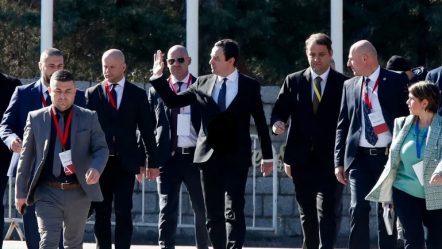 Linda Rama: Between Family, Work and Albania’s Future
Linda Rama: Between Family, Work and Albania’s Future Top Channel reveals the main points of the confidential document that American and European diplomats gave to Albin Kurti and Aleksander Vucic on the agreement between Kosovo and Serbia.
The document states that the parties must ‘not cross red lines’ but cooperate to solve problems, and Belgrade will not hinder Kosovo’s international integration.
The document shows the benefits and penalties, provides for the establishment of the Serbian association, economic benefits if the parties make an agreement and if they reject it, the integration is terminated.
SRB / KOS-CRITICAL REMARKS
Serbia-Kosovo normalisation process, fundamental principles:
– A framework to facilitate peaceful relations and coexistence, despite fundamental differences between the parties.
– A stable and reliable EU integration framework for Serbia and Kosovo, alongside the other WB6.
process supported by all 27 EU member states, non-recognisers included.
Two skilful top diplomats from non-recognising EU member states, Spain and Slovakia, manage the normalisation process to guarantee fairness.
The Agreement’s final text is a product of a comprehensive and thorough analysis of all present and past experiences. It is a unique political product, a genuine EU internal compromise acceptable to recogniser and non-recogniser member states.
The EU-sponsored Basic Agreement$ main elements:
Respects the red lines of the parties.
• To accommodate Serbia’s red line of not recognising Kosovo’s independence, Kosovo takes a step back on its insistence for a normalisation centred only on mutual recognition. Instead of fighting with Serbia, Kosovo pledges to work with Serbia on resolving the practical needs of all people and communities.
• Serbia takes a step back to accommodate Kosovo’s red line of not negotiating its independence and pledges to full practical relations with Kosovo.
Instead of fighting over Kosovo, Serbia pledges to work with the international community to benefit all people and communities living in Kosovo.
Commitment to regional peace and EU values.
• Serbia and Kosovo pledge to peaceful settlement of all disputes.
• Serbia commits to refraining from any action perceived as diplomatic hostility towards Kosovo.
• Kosovo commits to an appropriate level of self-management for the Kosovo Serb community in line with EU values and existing best practices.
EU’s duty of care towards WB6.
The Basic Agreement will not govern only the relations between Serbia and Kosovo. Alongside the Copenhagen Criteria, the Basic Agreement will also manage the EU integration process of Serbia and Kosovo.
• To avoid its past mistakes, the EU and the rest of the western community will actively support both parties financially, economically, and politically at each step of the way.
• Through the Berlin Process and the European Political Community, the EU and the rest of the western community will provide a reliable EU integration framework for Serbia, Kosovo, and the rest of the WB6.
Incentives:
The Basic Agreement offers a normalisation process with clear and reliable economic, financial and political incentives. Serbia’s acceptance will begin Serbia’s strong (long-due) strategic partnership with the western community. This partnership will transform Serbia into a pivotal regional economic and political driving force. It will also bring Serbia closer to the Kosovo Serb community.
Kosovo’s acceptance will mark the beginning of Kosovo’s breaking away from crisis management, a genuine opportunity to focus on substantial socio-economic development. Kosovo II finally be able to grow on its own.
What’s (all) at stake:
At a time when Russia tests the western resolve in Ukraine, at a time when China manages to broker a historic deal between Saudi Arabia and Iran, powerfully imposing itself as a world player capable of delivering, the western community doesn’t have the luxury of failure in the Western Balkans, the home yard of the EU and NATO.
Compromise is a principal value of the EU’s political culture and decision-making. The Basic Agreement is a genuine EU internal compromise acceptable to recogniser and non-recogniser member states. Serbia and Kosovo should embrace it as well. EU’s unity limits Serbia’s and Kosovo’s options:
Kosovo must fully meet the western community’s expectations, especially honouring past agreements. Kosovo’s refusal to do so can have severe consequences for Kosovo’s future. Disappointed, western partners will lack the incentive to support Kosovo’s further growth. Without this essential support, Kosovo could see a reversal of progress in some areas
Top Channel









